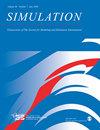Integrated analysis of employee cooperation and conflict behaviors in the context of digital technology
IF 2
4区 工程技术
Q4 COMPUTER SCIENCE, INTERDISCIPLINARY APPLICATIONS
Simulation-Transactions of the Society for Modeling and Simulation International
Pub Date : 2023-05-09
DOI:10.1177/00375497231171138
引用次数: 0
Abstract
Nowadays, the introduction of digital technology improves the condition of the workplace and employees’ productivity, but the unstable behavior of employees is still typical in Internet enterprises in China. Sometimes, employees frequently show their behavior reversals between cooperation and conflict. An integrated analysis method with three steps is performed to explore its reason. First, an evolutionary game model is employed to examine the strategies of individual employee’s behavior selection between cooperation and conflict. Second, the cellular automata are developed to simulate the evolution of employee group behavior selection over time. The frequent behavior turnovers between cooperation and conflict are illustrated. Third, catastrophe theory and method are used to identify the hidden cusp catastrophe patterns under the evolution of group behavior selection. Research results reveal that individual employee selects cooperation if the penalty exceeds half the cost. Simulation results show intense and sudden changes in employee group behavior selection, in which cusp catastrophe patterns exist. The cusp catastrophe model can intuitively interpret the mechanism by which factors, such as average perceived payoff and proportion of cooperation employees, influence the behavior state of the employee group. The mechanism of catastrophe in frequent behavior turnover is explored. This methodology, which is based on the theoretical framework of social exchange theory, integrates evolutionary game theory, simulation, and catastrophe theory to identify the catastrophe mechanism in behavior turnover and make theoretical and practical contributions to behavior selection research.数字技术背景下员工合作与冲突行为的综合分析
如今,数字技术的引入改善了工作场所的条件和员工的生产力,但在中国的互联网企业中,员工的不稳定行为仍然很典型。有时,员工在合作与冲突之间频繁出现行为反转。采用三步法综合分析其原因。首先,运用演化博弈模型考察了员工个体在合作与冲突之间的行为选择策略。其次,建立元胞自动机来模拟员工群体行为选择随时间的演变。说明了合作与冲突之间频繁的行为转换。第三,运用突变理论和方法识别群体行为选择演化下的隐性尖峰突变模式。研究结果表明,当惩罚超过成本的一半时,员工会选择合作。仿真结果表明,员工群体行为选择发生了剧烈而突然的变化,并存在尖点突变模式。尖点突变模型可以直观地解释平均感知报酬和合作员工比例等因素对员工群体行为状态的影响机制。探讨了频繁行为转换中的突变机制。该方法以社会交换理论为理论框架,将进化博弈论、模拟理论和突变理论相结合,识别行为更替中的突变机制,为行为选择研究做出理论和实践贡献。
本文章由计算机程序翻译,如有差异,请以英文原文为准。
求助全文
约1分钟内获得全文
求助全文
来源期刊
CiteScore
3.50
自引率
31.20%
发文量
60
审稿时长
3 months
期刊介绍:
SIMULATION is a peer-reviewed journal, which covers subjects including the modelling and simulation of: computer networking and communications, high performance computers, real-time systems, mobile and intelligent agents, simulation software, and language design, system engineering and design, aerospace, traffic systems, microelectronics, robotics, mechatronics, and air traffic and chemistry, physics, biology, medicine, biomedicine, sociology, and cognition.

 求助内容:
求助内容: 应助结果提醒方式:
应助结果提醒方式:


